
UNC Will Match $1 Million Prize to Aid Low-Income Students
Article Published by: alumni.unc.edu
The University has received the $1 million 2017 Cooke Prize for Equity in Educational Excellence, the largest award in the nation recognizing a college or university for its success in enrolling low-income students and supporting them to successful graduation.
UNC plans to raise $1 million in private funding to match the prize and will use the combined $2 million to further expand its programs benefiting low-income students.
The money will be used to:
- Extend and sustain recruitment and support of rural, low-income and first-generation-college students, with the aim of helping them thrive at UNC;
- Build on the groundbreaking work of the Carolina College Advising Corps, which recruits recent Carolina graduates to serve as near-peer student-success coaches for students who come to UNC from its 70 partner high schools, as well as others from rural and low-income households;
- Expand existing programs that fund internships, study abroad and summer courses for students who could not otherwise afford them;
- Foster collaborative projects among faculty and staff to advance equity in excellence, sustaining a pilot program launched last year through the Thrive@Carolina initiative that encourages colleagues to innovate together to strengthen success for all students; and
- Extend the benefits of the Carolina Covenant to nontraditional-age students.
The Covenant program provides debt-free financial aid for the lowest-income students.
Jack Kent Cooke Foundation Executive Director Harold O. Levy called Carolina “a national leader and role model for providing equal educational opportunity to students based on academic merit, regardless of family income.”
“High-achieving, low-income students have proven again and again that they can excel at the most competitive colleges and universities when given the opportunity and needed financial aid,” Levy said. “We owe them the opportunity to succeed, and we owe ourselves the opportunity to benefit from all they can accomplish for our nation and the world with a higher education.”
Chancellor Carol L. Folt said: “We have long drawn inspiration from the guiding principles of the foundation. Carolina is committed to living those principles as we strive for excellence and equity for students across North Carolina and far beyond our state’s borders.”
A study last year by the Cooke Foundation found that only 3 percent of students at top colleges across the nation come from the poorest 25 percent of families, while 72 percent come from the wealthiest 25 percent of families. This dramatic disparity shows why action is needed to enroll more high-achieving, low- and moderate-income students in such schools, Levy said.
A recent Cooke Foundation study calls on states to increase funding for their public flagship universities to give top moderate- and low-income students equal access to the public universities in their home states. The study found that many state universities are admitting a growing number of students from out of state to collect higher tuitions.
About 22 percent of UNC undergraduates are eligible for federal Pell Grants that go to low-income students.
The University awards 93 percent of financial aid based on need, and 44 percent of students get such aid. In addition to helping to pay for tuition, fees, and room and board, financial aid is available for travel, health insurance, personal expenses, books and supplies.
UNC also operates outreach programs to low-income middle and high school students, bringing them to its campus to familiarize them with college life. The First Look program introduces low-income middle school students to the idea of college, building on research that shows students who experience a college atmosphere by middle school are more likely to enroll in postsecondary education and to prepare for college while in high school. The Carolina College Advising Corps serves 23 percent of low-income public high school students in the state, employing 51 recent UNC alumni as advisers to help high school seniors identify and apply to colleges.
The University’s Carolina Student Transfer Excellence Program partners with community colleges to guarantee admission to high-achieving, low-income transfer students and provides financial aid packages with little or no student debt.
This is the third year the Cooke Prize is being awarded. Vassar College received the prize in 2015 and Amherst College received it in 2016.
About Scott Livengood
Scott Livengood is the owner and CEO of Dewey’s Bakery, Inc., a commercial wholesale bakery with a respected national brand of ultra premium cookies and crackers.
Previously, Scott worked at Krispy Kreme Doughnuts for 27 years, starting as a trainee in 1977. He was appointed President of the company in 1992, then CEO and Chairman of the Board.
Scott has served on numerous boards including the Carter Center, the Calloway School of Business and the Babcock School of Management, Habitat for Humanity of Forsyth County, and the Winston-Salem Chamber of Commerce.
He started a new business, StoryWork International, in 2016 with Richard Stone. The signature achievement to date is LivingStories, a story-based program for improved patient experiences and outcomes in partnership with Novant Health.




